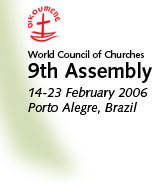 |
WCC > Home > Theme & issues > Other topics > Ecumenism in the 21st century | ||||
| About the assembly | Programme | Theme & issues | News & media | |||||
 |
|
||||
|
Ecumenism in the 21st centuryThe last half of the 20th century witnessed the birth and growth of many ecumenical organizations at the national, regional and global level. These organizations were established primarily by churches to undertake work on their behalf, and each has developed its own priorities, programmes and governance structures. Over the last ten years, there has been much discussion as to how these different ecumenical organizations relate to each other and whether the current structural relationships are the most effective for responding to the fresh challenges of the 21st century. The issue of whether we need a reconfiguration of the ecumenical movement is firmly on the WCC's agenda. Further information and linksMapping the Oikoumene: A study of current ecumenical structures and relationships (2005) Final statement from a 2004 consultation on "Ecumenism in the 21st century" (presented at the WCC 2005 central committee meeting) "From Antelias with love": Report of a consultation on the configuration of the ecumenical movement, Antelias, Lebanon, 2003 WCC central committee background document on "Reconfiguration of the ecumenical movement" (2003) |
|||
|
|
|



